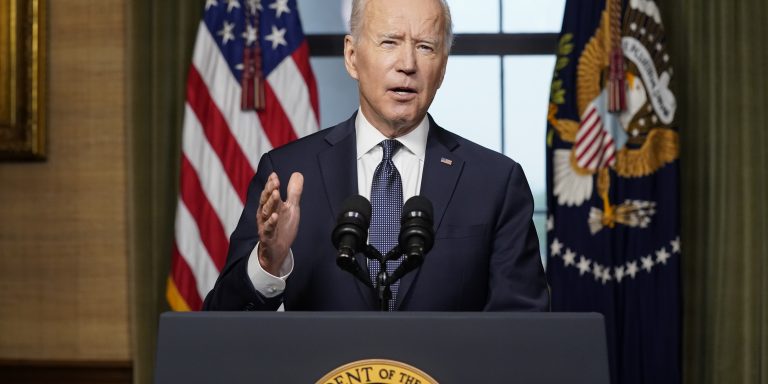INTELBRIEF
April 15, 2021
IntelBrief: Biden Administration to Withdraw Remaining U.S. Troops from Afghanistan

Bottom Line Up Front
- President Joe Biden has announced that the U.S. will withdraw its troops from Afghanistan, formally ending America’s longest war.
- The announcement that the withdrawal will be complete by September 11 has handed the Taliban a victory with little clear gain for the U.S. and partners.
- The withdrawal will leave no U.S. counterterrorism capability on the ground, increasing U.S. reliance on Afghan partners to handle emerging threats.
- The withdrawal announcement has led many to reference the lessons of Iraq in 2011, the collapse of the Iraqi security forces, and the rise of ISIS.
In a speech to the country yesterday, President Joe Biden announced that the United States would be withdrawing its troops from Afghanistan, formally ending America’s longest war and setting the deadline for withdrawal as September 11, 2021. The withdrawal itself is calendar-based and not conditions-based, leaving the Biden administration open to criticism from opponents of withdrawal. The decision was met with disapproval from Congressional Republicans, with Mitch McConnell (R-KY) calling the withdrawal a “grave mistake.” Lindsey Graham (R-SC) suggested the move could lead to another 9/11, implying that al-Qaeda would once again develop the capabilities to attack the U.S. homeland. Within Afghanistan, there has long been apprehension that a relatively abrupt U.S. departure, without concrete gains, would jeopardize two decades of hard-won progress towards democracy, particularly for women’s rights and access to public and political life.
It is not clear what factors prompted determinations around the withdrawal date, beyond the coincidence with the twentieth anniversary of the attacks of September 11, 2001 in the United States, perpetrated by al-Qaeda, under the protection of the Taliban. The date itself, whether intentional or not, hands a symbolic victory to the Taliban and al-Qaeda, with little clear gains for the U.S. and its partners. Indeed, al-Qaeda’s propaganda arm, As-Sahab, announced a forthcoming message from its “General Headquarters,” almost certain to be a response to the U.S. decision. The Taliban and its allies have scored a monumental public relations victory, one that is sure to be featured in propaganda that celebrates the Taliban’s victory while simultaneously denigrating the U.S. and its allies and vindicates al-Qaeda’s narrative of a long-term victory. The chosen withdrawal date plays into the jihadi narrative of a “crusader occupation” and seems like an error on the part of the Biden administration that could have been avoided.
The withdrawal will leave no U.S. counterterrorism capability on the ground, increasing U.S. reliance on Afghan partners to handle emerging threats; they have not had a strong record in resisting the Taliban without American assistance. Few would be surprised if the Taliban gained control over large swaths of Afghanistan by early 2022. Since the Taliban has never even attempted to break from al-Qaeda – which enjoyed its protection in a region where the bond between host and guest can be almost unbreakable – many analysts expect al-Qaeda to rebound from its recent setbacks. Al-Qaeda will likely seek to regrow its capabilities to the point where it could once again launch spectacular attacks on the West. Under the terms of the withdrawal, the U.S. government has pledged to “hold the Taliban to its commitment to ensure al Qaeda does not once again threaten” the U.S. and allied interests, while developing an offshore counterterrorism posture with “Afghan partners and with other allies.”
To be sure, al-Qaeda’s global network has been diminished following a two-decade counterterrorism campaign waged by the U.S. and its allies. But as the Annual Threat Assessment from the U.S. intelligence community lays out, al-Qaeda remains among “the greatest Sunni terrorist threats to US interests overseas”; although counterterrorism pressure has degraded the group’s capabilities, al-Qaeda still “seek[s] to conduct attacks inside the United States.” The withdrawal and potential resurgence of a transnational terrorist group has led many, including retired Navy SEAL Admiral William McRaven, to reference the lessons of the 2011 U.S. withdrawal from Iraq and subsequent collapse of the Iraqi security forces in the face of an offensive by the so-called Islamic State, which itself emerged from the detainee camps set up by the U.S. The ISIS comparison is apt, because, in addition to the potential for a resurgence of al-Qaeda in Afghanistan, the Islamic State Khorasan Province (ISKP) is also active along the Afghanistan-Pakistan border and may seek to exploit the uncertainty and security gaps left by the withdrawal.
The threat is not a hypothetical one. A terror cell arrested in Germany in April 2020, which was found to be plotting attacks against U.S. and NATO bases, was receiving instructions from an ISIS operative based in Afghanistan. A return to a situation where Afghanistan is once again used as a sanctuary by Salafi-jihadists seeking to attack the West will lead the U.S. to deeply regret leaving the country according to a calendar-based withdrawal, rather than one precipitated by conditions on the ground. Beyond the direct implications for the United States, the withdrawal poses a question about the returns on the heavy investment in terms of blood and treasure, and the impact on Afghans themselves. Many Afghans have come of age over the previous two decades with the expectations of progress in democracy and human rights, and a country on a path, no matter how difficult, leading away from the dark legacies of Taliban rule. The announced withdrawal deadline establishes a transition timeline without linking action to such outcomes and progress.